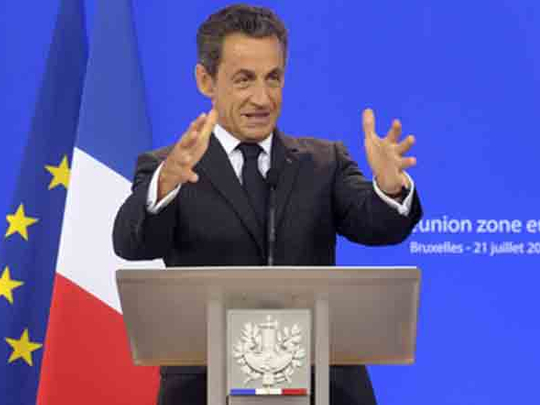
French President Nicolas Sarkozy's favourite film is A Man Escaped, Robert Bresson's 1956 classic about a Resistance fighter who evades his death sentence by scaling the walls of Fort Monluc, a Nazi prison near Lyon, and vanishing into thin air.
With less than three months to go before the presidential elections, France is debating whether its hyperactive leader is planning a similar Houdini-style operation — and if so, to what end? Is he simply looking forward to escaping the political world and running off into the sunset with his wife, Carla Bruni-Sarkozy, and Giulia, their baby?
That seemed to be the message contained in ‘off the record' remarks Sarkozy made in French Guiana a week ago to an incredulous French press pack. "In case of failure, I stop politics. Yes, that is a certainty," Sarkozy mused.
"For the first time in my life, I'm confronted by the end of my career ... I could begin my weeks on Tuesday and finish them on Thursday night!" said the man elected on a platform to work more to earn more. "In any case, I'll change my life completely, and you won't hear from me again."
The country has since been subjected to another batch of soul-searching, in which the president — unusually — expressed "regrets" for some of the most damaging decisions he has made in office. These ranged from placing his son Jean at the helm of La Defense, France's biggest business district, to rushing off to the pyramids with Carla during their whirlwind romance.
But for all his apparent acceptance that the political end is nigh, the prospect of ‘Sarko' quietly vanishing into the mists after five years of hogging the limelight on the French, European and — when he could manage it, the world — stage, is difficult to picture.
A more plausible interpretation of his love for A Man Escaped is that, like its French hero, he still believes he can defy the odds to pull off one of the unlikeliest victories for an incumbent French president in modern political history.
Sarkozy was elected in 2007 as a quasi-Thatcherite figure who would grab France by the horns and inject his trademark dynamism into its economy. Such talk briefly made him France's most popular post-war president but that was before he was undone by his showiness, his unpresidential manner and his over-the-top private life.
Rejection
Today, the majority of the French reject him — not to say hate him — to an almost irrational degree. Opinion polls suggest he will be roundly defeated by Francois Hollande, the Socialist candidate. Sarkozy recently boasted that the Socialist Mr Ordinary would melt like a sugar cube when under pressure but, svelte and tanned after a crash diet and a makeover, Hollande has proved in the past week he is anything but a soft touch.
As things stand, Sarkozy may even suffer the humiliation of failing to make it to round two. He could be knocked out by far-Right leader Marine Le Pen — who is trailing him by as little as three percentage points in some polls — or by the popular centrist candidate Francois Bayrou.
It is early days, however. Sarkozy has not officially launched his campaign for re-election, but the contours of his unlikely comeback bid are becoming clear, starting with a first, personal phase in which he attempts to convince the French he has changed yet again.
"He wants people to start fearing that maybe he will soon be gone. By expressing regret, it shows how much he has changed," says Dominique Moisi, a political analyst. "Yesterday he was the new man, offering a break vis a vis Jacques Chirac; today he is offering a ‘break' with himself. He is saying, ‘There was an old Sarkozy whom you criticised and were right to do so, but there is a new, wiser, more experienced Sarkozy you saw last night'."
That new Sarkozy is trying to prove that only he has the "courage" and "sincerity" to captain France through perilous economic waters, while his "arrogant" rival Hollande peddles "cheap dreams" that look back to the Soviet era.
That will prove an uphill struggle after France lost its triple A credit rating last month and unemployment rose to a 12-year high of almost 10 per cent. Polls suggest the French see Hollande as a safer pair of hands.
Sarkozy has a key ally in the shape of German Chancellor Angela Merkel, who let it be known last weekend that she will back his re-election campaign and possibly even attend his first rally.
Wedding his political future to the German model of low unemployment, higher productivity and exports, Sarkozy on Sunday announced a hike in value-added tax to 21.2 per cent to fund a cut in employer social charges, and the possibility of cutting working hours and pay to save jobs.
He is said to have chosen this path after a recent visit from Gerhard Schroeder, who introduced the measures in Germany in the early 2000s, just as France's Socialist government brought in the 35-hour working week.
But relying on ‘Merkozy' power is a dangerous game. Economists are warning that France's economy based on consumption cannot mirror that of the Germans, and Merkel's support could smack of interventionism. Even if Sarkozy's eleventh-hour plans to help the economy could be positive, the rub lies elsewhere, says Moisi.
The latest film Sarkozy watched with his wife at the Elysee was The Iron Lady, starring Meryl Streep, whose performance as Margaret Thatcher "deeply moved" the president. He told Paris Match that while she was "detested" by many in Britain while in office, she was now "celebrated". But for now, his hopes of emulating her are as fanciful as the Socialist "dream" Sarkozy warns will wreak ruin on the country should he lose.
— The Telegraph Group Ltd, London 2012








